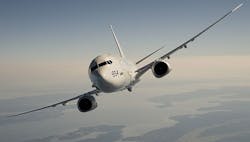P-8 Poseidon Navy maritime patrol jet to receive avionics upgrades for anti-submarine warfare (ASW) sonobuoys
PATUXENT RIVER NAS, Md., 14 Feb. 2013. The U.S. Navy P-8A Poseidon, a military maritime patrol version of the Boeing 737 single-aisle passenger jet, will receive anti-submarine warfare (ASW) avionics upgrades and support services under terms of a $7.2 million contract modification announced Monday.
The Naval Air Warfare Center Aircraft Division at Patuxent River Naval Air Station, Md., awarded the contract modification to ERAPSCO Inc. in Columbia City, Ind., for engineering and manufacturing development services in support of the P-8A's High Altitude Anti-Submarine Warfare (HAASW) system. The action involves an indefinite-delivery/indefinite-quantity contract.
ERAPSCO and its sister company Sonobuoy TechSystems in Columbia City, Ind., are joint ventures between Sparton Corp. in De Leon Springs, Fla., and Ultra Electronics UnderSea Sensor Systems Inc. (USSI) in Columbia City, Ind. The companies design and build Navy sonobuoys and transducers.
Navy officials plan to use the P-8A in tandem with the Northrop Grumman RQ-4N Broad Area Maritime Surveillance (BAMS) unmanned aerial vehicle (UAV) -- a maritime-patrol version of the Global Hawk long-range surveillance UAV.
Navy ASW experts will use BAMS to detect potentially hostile submarines and surface ships, and upon detection, to call in the P-8A to take a closer look or to attack hostile vessels with torpedoes and missiles. The P-8A tracks submerged submarines by laying down arrays of sonar-carrying sonobuoys on the ocean's surface.
The HAASW integrates modified sonobuoy sensors to enhance the P-8A's ability to track submarines and other maritime vessels from higher than traditional fixed-wing airborne ASW altitudes.
Relatively high altitudes for the P-8A are to enhance communications range with large-area buoy fields, as well as to enhance coverage from other onboard non-acoustic sensors. The HAASW capability for P-8A is to be part of the aircraft's Increment 2 upgrade to the baseline (Increment 1) aircraft.
The HAASW system can receive, process, and store in-buoy GPS data received from AN/SSQ-53, AN/SSQ-62, and AN/SSQ -101B sonobuoys; will integrate the GPS drop vector algorithm to enhance buoy splash point prediction and accuracy in real time; and will receive, command, and process the AN/SSQ-101B sonobuoy with a digital uplink and downlink.
The SSQ-53 is a passive directional low frequency analyze and record sonobuoy; the SSQ-62 is a directional command active sonobuoy; and the SSQ-101 is an air deployed active receiver. All are built by Sonobuoy TechSystems.
For the ERAPSCO contract modification announced Monday, the company will do the work in DeLeon Springs, Fla. and Columbia City, Ind., and should be finished in May 2014.
Last December Naval Air Warfare Center Aircraft Division officials announced their intention to procure a HAASW systems upgrade and engineering support for the Software Defined Sonobuoy Receiver (SDSR) and Many channel Programmable Acoustic Processor Stimulator (PAPS) Radio Subsystem (McPRS) on a sole source basis with Ultra Electronics Flightline Systems Inc. in Victor, N.Y.
The SDSR is packed in a 6U VME chassis, and has 32 acoustic channels supported by the basic configuration of the SDSR, which consists of three standard 6U VME boards. The SDSR is controlled by Gigabit Ethernet, and requires an external preamplifier to filter and amplify received sonobuoy acoustic information.
The SDSR works with all digital and analogue sonobuoys, and offers software support for several bandwidths and formats. Options include 64 acoustic channel capability, analogue outputs, and Sonobuoy Positioning System (SPS) capability.
For more information contact ERAPSCO online at http://erapsco.com, Sonobuoy TechSystems at www.sonobuoytechsystems.com, Sparton Corp. at http://sparton.com, Ultra Electronics USSI at www.ultra-ussi.com, Ultra Electronics Flightline Systems at www.ultra-fei.com, or the Naval Air Warfare Center Aircraft Division at www.navair.navy.mil/nawcad.

John Keller | Editor-in-Chief
John Keller is the Editor-in-Chief, Military & Aerospace Electronics Magazine--provides extensive coverage and analysis of enabling electronics and optoelectronic technologies in military, space and commercial aviation applications. John has been a member of the Military & Aerospace Electronics staff since 1989 and chief editor since 1995.


